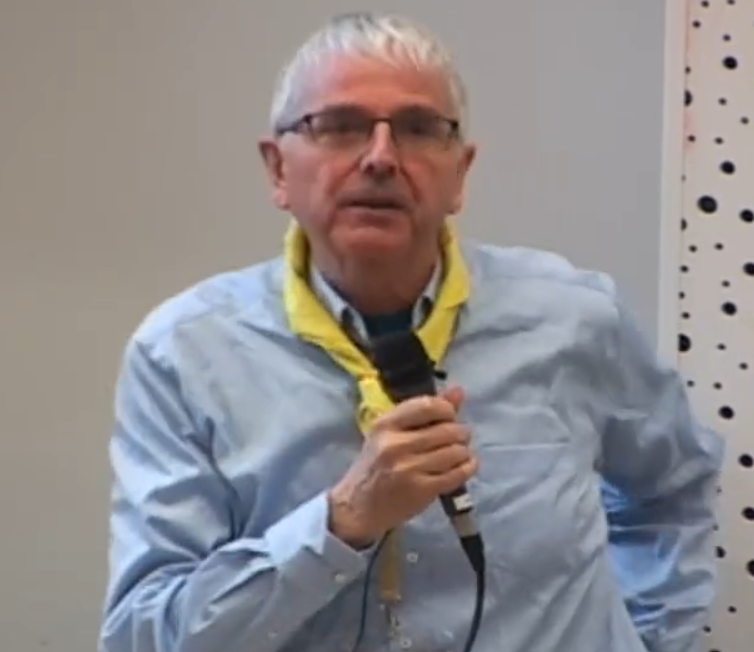April, 17-20, 2018
Residenza di Ripetta - Via di Ripetta, 231
Rome - Italy
| 16th Int'l Conference on Project Management and Scheduling April, 17-20, 2018 Residenza di Ripetta - Via di Ripetta, 231 Rome - Italy |
| Home | Venue | Call For Papers | Lodging |
| Committees | Scientific Program | Social Program | Invited Speakers |
| Important Dates | Registration Fee | Sponsors | Special Issue |
| INVITED SPEAKERS | |||
| Prof. Jacques Carlier | Prof. Erik Demeulemmester | Prof. Erwin Pesch | Prof. Ruben Ruiz |
Université de Technologie de Compiègne | KU Leuven | Universität Siegen | Polytechnic University of Valencia |
 |  |  |  |
| Comparing Event-Node Graphs with Nonrenewable Resources and Activity-Node Graphs with Renewable Resources | On the construction of optimal policies for the RCPSP with stochastic activity durations
| Optimization Problems in Intermodal Transport | Simple metaheuristics for Flowshop Scheduling: All you need is local search |
| At the
end of the fifties, two main approaches were proposed to manage a large
project: the PERT method and the MPM method. In both approaches the
project is modelled by a graph and one has to compute critical paths.
In the PERT graph, an activity is represented by an arc whenever nodes
represent events. In the MPM graph, an activity is represented by a
node whenever arcs represent precedence constraints. The drawback of
both methods is that they do not take into account resources. The
specific drawback of the event-node graph is its large size. The
scheduling literature is essentially devoted to problems with renewable
resources and precedence constraints, modelled by an activity-node
graph. Renewable resources are allocated to activities at their
starting times and released at their completion times. A machine is an
example of a renewable resource. The basic problem is the Resource
Constrained Project scheduling Problem (RCPSP). The aim of this talk is
to rehabilitate event-node graph and nonrenewable resources. A
nonrenewable resource is produced or consumed by an activity at its
occurrence time. The money is an example of a nonrenewable resource.
Our basic problem is the Extended Resource Constrained Project
Scheduling Problem (ERCPSP). We will present a brief review of
literature on ERCPSP. We will explain that several approaches built for
RCPSP can be adapted to ERCPSP. We will also report some polynomial
algorithms. Next we will introduce several lower bounds and some linear
programming models inspired from RCPSP ones. Finally we will report
some computational results and explain why it is useful to study ERCPSP. |
The
majority of publications in the extensive literature on
resource-constrained project scheduling focus on a static deterministic setting for which
a so-called baseline schedule is computed prior to project execution.
In the real world, however, a project may be subject to considerable
uncertainty. During the actual execution of a project, the baseline
schedule may indeed suffer from disruptive events causing the
actually realized activity start times to deviate from the predicted
baseline start times. This plenary focuses on the construction of
optimal policies for the RCPSP with stochastic activity durations,
meaning that an optimal baseline schedule is selected as well as all
optimal continuations in case a disruption occurs in the baseline
schedule or in an already adapted schedule. First, we will take a
look at the general case and discuss two models that are capable of
constructing ‘optimal’ policies in the sense that these are
optimal within the set of schedules that are considered. Next, we
will consider a serial project scheduling problem of at most four
activities, where the durations of the activities can take on two
possible durations. For that particular case, we will construct the
real optimal policies and we will infer some rules that can be useful
in order to construct better schedules for the general case such that
the resulting ‘optimal policies’ are improved.
| In
intermodal container transportation, where containers need to be
transported between customers (shippers or receivers) and container
terminals (rail or maritime) and vice versa, transshipment of
containers is commonly arranged at the terminals. Attracting a higher
share of freight traffic on rail requires freight handling in railway
terminals that is more efficient, and which includes technical
innovations as well as the development of suitable optimization
approaches and decision-support systems. In this talk we will review
some optimization problems of container processing in railway yards,
and analyze basic decision problems and solution approaches for the two
most important yard types: conventional rail-road and modern rail-rail
transshipment yards. Furthermore, we review some of the relevant
literature and identify open research challenges. Additionally we address a container dispatching and conflict-free gantry crane routing problem that arises at a storage container block in an automated, maritime container terminal. A container block serves as an intermediate buffer for inbound and outbound containers and exchanges of containers between water- and landside of a maritime terminal. The considered block is perpendicular to the waterside and employs two rail mounted gantry cranes. Cranes may have the same or different sizes and therefore either are based at the opposite sides of the container block or can cross each other. The question arises in which order and by which crane containers are transported in order to minimize the makespan and prevent crane conflicts. |
Many
scheduling problems are simply too hard to be solved exactly,
especially for instances of medium or large
size. As a result, the literature on heuristics and metaheuristics
for scheduling is extensive. More often than not, metaheuristics are
capable of generating solutions close optimality or to tight lower
bounds for instances of realistic size in a matter of minutes.
Metaheuristics have been refined over the years and there is
literally hundreds of papers published every year with applications
to most domains in many different journals. Most regrettably, some of
these methods are complex in the sense that they have many parameters
that affect performance and hence need careful calibration.
Furthermore, many times published results are hard to reproduce due
to specific speed-ups being used or complicated software constructs.
These complex methods are difficult to transfer to industries in the
case of scheduling problems. Another important concern is the
recently recognized “tsunami” of novel metaheuristics that mimic
the most bizarre natural or human processes, as for example
intelligent water drops, harmony search, firefly algorithms and the
like. See K. Sörensen “Metaheuristics—The Metaphor exposed”
(2015), ITOR 22(1):3-18.
In this presentation, we review many different flowshop related problems. From the basic flowshop problem with makespan minimization to other objectives like flowtime minimization, tardiness, flowshops with sequence-dependent setup times, no-idle flowshops or other variants and extensions, all the way up to complex hybrid flexible flowline problems. We will show how simple Iterated Greedy (IG) algorithms often outperform much more complex approaches. IG methods are inherently simple with very few parameters. They are easy to code and results are easy to reproduce. We will show that for all tested problems so far they show state-of-the-art performance despite their simplicity. As a result, we will defend the choice of simpler, yet good performing approaches over complicated metaphor-based algorithms. |
| Prof. Jacques Carlier | Jacques Carlier was born in Paris, France on 1949 September 25. He receives the degrees of Computer Science in 1972 and Mathematics in 1974, MSc (DEA) in Operations Research in 1973, PhD (Doctorat de troisième cycle) on Disjunctive Scheduling Problems in 1975 and PhD (Doctorat d’état) on Resource Constrained Project Scheduling in 1984, all from University of Paris VI. From 1974 to 1985, he was assistant-Professor at the same University. Since 1985 he is Professor at Compiègne University of Technology, emeritus since 2015. He was teaching Operations Research, Mathematics and Computer Science. His research interests concern Combinatorial Optimization and in particular scheduling problems, telecommunication networks and network reliability. During his carrier, he was the supervisor of more than 30 PhD students. His works on scheduling are well known. They include methods for the one machine sequencing problem, the m-machine scheduling problem, the job-shop, the RCPSP and the financing problem. He is member of the editorial board of EJOR and RAIRO and has published 60 papers in international journals. |
| Prof. Erik Demeulemeester |
Erik
Demeulemeester is Professor in the Research Center for Operations
Management at the KU Leuven. He earned the degree of commercial
engineer (field of Management Informatics) in 1987, the degree of
Master of Business Administration in 1988 and a PhD in 1992, all from
the KU Leuven. The title of the PhD was ‘Optimal algorithms for
various classes of multiple resource-constrained project scheduling
problems’. At present, he is Full Professor
from 2001 on and currently teaches a course on project and production
scheduling, a PhD course on combinatorial optimization and local
search techniques as well as a seminar on production and logistics.
His main research interests are situated in the field of project
scheduling and health care (operating room) planning and he has
published many papers on these topics. |
| Prof. Erwin Pesch | Erwin Pesch studied Mathematics and Computer Science at the Technical University Darmstadt. He worked at the Commerzbank AG and later as assistant professor at the University in Maastricht (Netherlands) and as professor in the Institute of Economics of the University in Bonn. Currently, he is a full professor at the Faculty of Economics and Business Administration of the University in Siegen and director of the Center for Advanced Studies in Management at the HHL Leipzig Graduate School of Management. He holds a Ph.D. in Mathematics and a Habilitation in Business Administration. His research areas are mainly in Logistics, Scheduling and Project Management, and Personnel Planning many of which are closely related to different industrial projects. He received a number of distinctions, e.g., the Copernicus Prize (together with J. Blazewicz) jointly awarded by the national science foundations DFG and FNP. He is author or co-author of 6 books about 200 papers in many international journals. He is area or associate editor of 13 scientific journals, has frequently been a keynote or plenary speaker at international conferences, and was responsible for the organization of the ECCO 2001 and the EURO 2009 conference in Bonn that attracted 2500 delegates. |
| Prof. Ruben Ruiz |
Ruben
Ruiz is a Full Professor of Statistics and Operations Research at the
Polytechnic University of Valencia, Spain. He is co-author of more than
60 papers in International Journals and has participated in
presentations of more than 150 papers in national and international
conferences. He is editor of the Elsevier journal Operations Research
Perspectives (ORP) and co-editor of the JCR-listed journal European
Journal of Industrial Engineering (EJIE). He is also associate editor
of other important journals like TOP and Applied Mathematics and
Computation as well as a member of the editorial boards of several
journals, most notably European Journal of Operational Research and
Computers and Operations Research. He is the director of the Applied
Optimization Systems Group (SOA, http://soa.iti.es) at the
Instituto Tecnológico de Informática (ITI, http://www.iti.es)
where he is or has been the principal investigator in several public
research projects as well as privately funded projects with industrial
companies. His research interests include scheduling and routing in
real life scenarios.
|